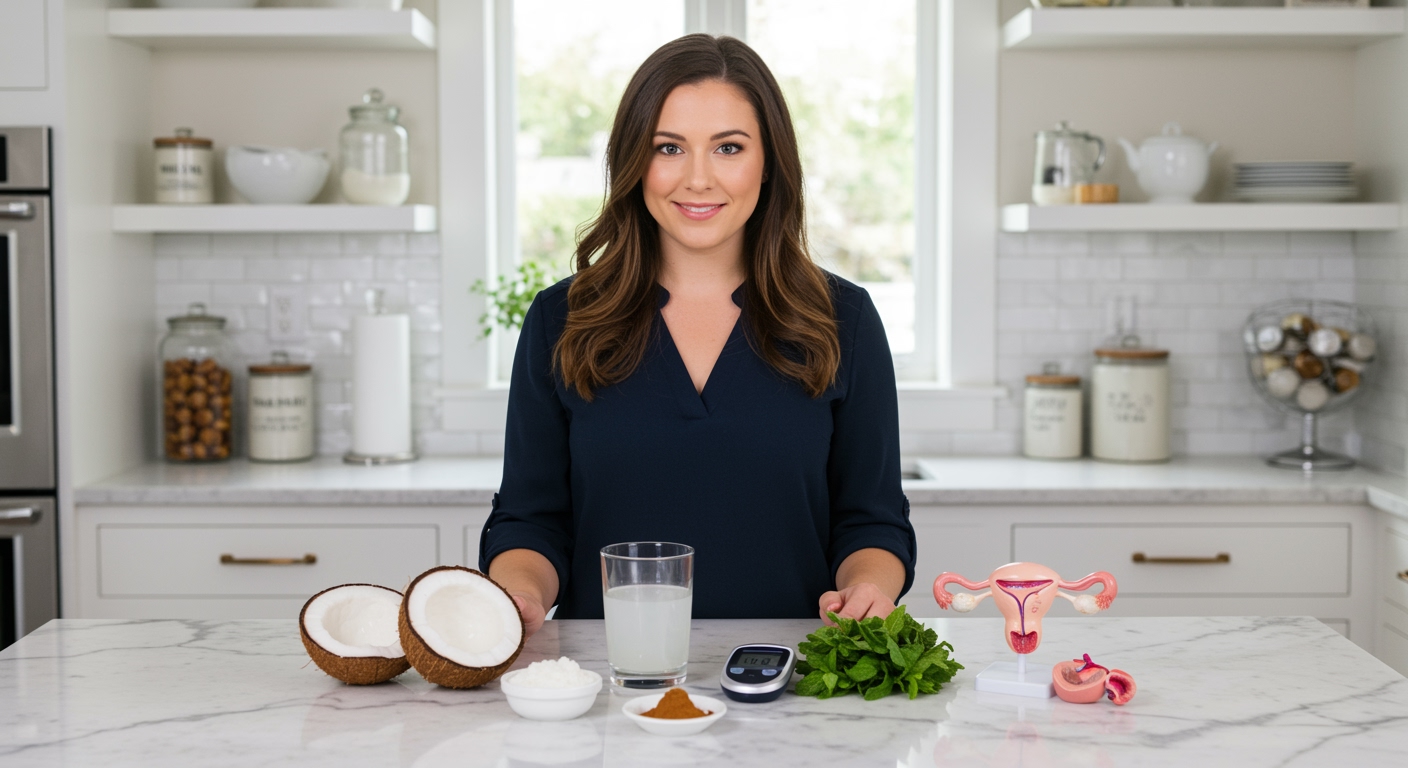✪ Key Takeaway: Chickpeas help manage PCOS by improving insulin sensitivity, balancing hormones, and reducing inflammation through their fiber and protein content.
Introduction
You grab a can of chickpeas from your pantry and wonder if this simple legume could actually help with your PCOS symptoms.
Many women with PCOS struggle to find foods that support their hormone balance without causing blood sugar spikes or weight gain.
Hi, I’m Abdur, your nutrition coach, and today I’m going to explain how chickpeas can become a powerful ally in your PCOS management strategy.
How Do Chickpeas Affect Blood Sugar in PCOS?
Chickpeas have a low glycemic index of around 28, which means they release glucose slowly into your bloodstream.
This slow release prevents the dramatic blood sugar spikes that worsen insulin resistance in PCOS.
One cup of cooked chickpeas contains about 12 grams of fiber, which slows down sugar absorption even further.
The fiber also feeds beneficial gut bacteria that produce short-chain fatty acids, which improve insulin sensitivity.
Research shows that women with PCOS who eat more legumes like chickpeas have better glucose control and lower insulin levels.
✪ Pro Tip: Eat chickpeas with healthy fats like olive oil to slow digestion and maximize blood sugar benefits.
Can Chickpeas Help Balance Hormones?
Chickpeas contain phytoestrogens called isoflavones that can help regulate hormone levels in women with PCOS.
These plant compounds bind to estrogen receptors and may help reduce elevated androgen levels that cause PCOS symptoms.
The high protein content in chickpeas also supports the production of sex hormone-binding globulin, which helps control free testosterone.
Studies suggest that women who consume more plant proteins have lower levels of inflammatory markers associated with hormonal imbalances.
The magnesium in chickpeas supports healthy cortisol levels, which is crucial since chronic stress worsens PCOS symptoms.
Regular consumption of chickpeas may help restore the delicate balance between reproductive hormones that PCOS disrupts.
✪ Fact: Chickpeas provide 26% of your daily magnesium needs, which is essential for hormone production.
What Makes Chickpeas Anti-Inflammatory for PCOS?
Chronic inflammation drives many PCOS symptoms, and chickpeas contain powerful anti-inflammatory compounds that can help.
The antioxidants in chickpeas, including quercetin and kaempferol, neutralize free radicals that trigger inflammatory responses.
These compounds specifically target the type of inflammation that occurs in ovarian tissue and contributes to cyst formation.
Chickpeas also contain saponins, which have been shown to reduce inflammatory markers like C-reactive protein and interleukin-6.
The fiber in chickpeas promotes the growth of beneficial bacteria that produce anti-inflammatory metabolites in your gut.
Research indicates that women with PCOS who follow anti-inflammatory diets rich in legumes experience fewer symptoms and better metabolic health.
✪ Note: Soaking dried chickpeas overnight and cooking them fresh maximizes their anti-inflammatory benefits.
How Much Should You Eat and When?
The optimal serving size for chickpeas is about half a cup of cooked chickpeas, which provides approximately 15 grams of protein and 6 grams of fiber.
Eating this amount 3-4 times per week can provide significant benefits for PCOS management without causing digestive discomfort.
The best time to eat chickpeas is during lunch or dinner when your body can use the sustained energy they provide.
Combining chickpeas with vegetables and healthy fats creates a balanced meal that supports stable blood sugar throughout the day.
If you experience bloating, start with smaller portions and gradually increase as your digestive system adapts to the higher fiber intake.
Women with PCOS who consistently include chickpeas in their diet report better energy levels and fewer cravings for processed foods.
✪ Pro Tip: Rinse canned chickpeas thoroughly to reduce sodium content and improve digestibility.
Are There Any Risks or Side Effects?
Chickpeas are generally safe for most women with PCOS, but some may experience digestive issues when first increasing their intake.
The high fiber content can cause gas, bloating, or stomach discomfort if you suddenly add large amounts to your diet.
Women with irritable bowel syndrome or small intestinal bacterial overgrowth may need to limit their chickpea consumption or choose sprouted varieties.
Chickpeas contain moderate amounts of purines, so women with gout or kidney stones should consult their healthcare provider before increasing intake.
Some people may have allergic reactions to chickpeas, especially those with existing legume allergies or sensitivities.
The key is to introduce chickpeas gradually and monitor how your body responds to find the right amount for your individual tolerance level.
✪ Fact: Cooking chickpeas with digestive spices like cumin and ginger can reduce potential side effects.
The Bottom Line
Chickpeas can be a valuable addition to your PCOS management plan through their ability to stabilize blood sugar, reduce inflammation, and support hormone balance.
Simple foods often hold the most powerful solutions for complex health challenges.
I would love to hear about your experience with chickpeas or any questions you might have about incorporating them into your PCOS diet in the comments below.
References
At NutritionCrown, we use quality and credible sources to ensure our content is accurate and trustworthy. Below are the sources referenced in writing this article:
- Mayo Clinic: PCOS Diagnosis and Treatment
- PMC: Nutritional Management of PCOS
- Cleveland Clinic: PCOS Diet Guidelines
- Brown Health: Eating Well with PCOS





